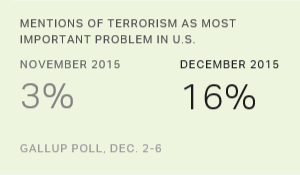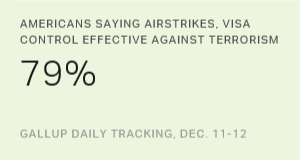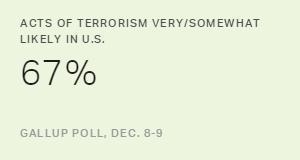Story Highlights
- 47% say they are worried about being a victim of terrorism
- 38% say they are worried about being a victim of a mass shooting
- Republicans more worried than Democrats about mass shootings, terrorism
WASHINGTON, D.C. -- More Americans are "very" or "somewhat" worried that they or a family member will become a victim of an Islamic State-inspired terrorist attack (47%) than they are about becoming a victim of a mass shooting (38%). But a majority of Americans say they are not worried about either potential event.

These results, from a Â鶹´«Ã½AV poll conducted Dec. 11-12, are similar to those from another Â鶹´«Ã½AV trend, which makes no mention of ISIS, and shows 51% currently saying they .
Americans may perceive that there have been an increasing number of "mass shootings" in the U.S. in recent years. This subject is under debate because there is not a commonly accepted definition for mass shootings. Shootingtracker.com defines mass shootings as "an event or related series of events where four or more people are shot, likely without a cooling-off period." At the other end of the spectrum, Mother Jones defines a mass shooting as "a single incident in a public place, excluding gang activity, armed robbery or domestic violence, in which four or more people are killed." Based on shootingtracker.com's definition, there were 353 mass shootings from Jan. 1 through Dec. 5 of this year. But based on Mother Jones' definition, there were four. Other definitions place the number somewhere in the middle on that spectrum.

There have been far fewer terrorist attacks in the United States, as opposed to more general mass shootings, but this month the issue gained prominence with the terrorist action in San Bernardino, California. Police say a husband and wife were "radicalized" by the Islamic State and carried out an attack at the Inland Regional Center, where 14 people were killed and 21 injured in shootings and an attempted bombing. This attack followed a coordinated Islamic State attack on multiple locations in Paris in November. Both of these events are examples of terrorist attacks that could be considered "mass shootings" by certain definitions of the term.
Republicans More Worried Than Democrats About Terrorism and Mass Shootings
Looking at political party identification, 64% of Republicans and Republican-leaning independents say they are "very" or "somewhat" worried about themselves or a family member being a victim of a terrorist attack by the Islamic State, while 35% of Democrats and Democratic-leaning independents say the same.
Republicans are also more worried than Democrats about a mass shooting, 46% vs. 32%, respectively. But a slim majority of Republicans and a commanding majority of Democrats say they are "not too" worried or "not at all" worried about such an event.

Bottom Line
While mass shootings seem to be a common aspect of American life nowadays, and terrorist attacks are relatively rare, more Americans say they are worried about being victimized by the latter than the former. This may be because the definition of a mass shooting is a subject of debate, or because memories of catastrophic attacks, such as 9/11, on American soil still loom large in the public consciousness.
American leaders have offered solutions to these problems, ranging from curbing sales of certain weapons and expanded background checks to reduce mass shootings, to increased U.S. military bombings overseas and greater intelligence gathering in the U.S. to combat the Islamic State. Â鶹´«Ã½AV has asked Americans , from increasing airstrikes against ISIS and overhauling the federal visa waiver program, to requiring Muslims to carry a special ID and even banning those who identify as Muslim from entering the country. While Americans say the last two options are not effective in fighting ISIS, it is clear that during this political season, elected officials and politicians will be searching to assuage the fears of an uneasy electorate about the terrorism threat.
These data are available in .
Survey Methods
Results for this Â鶹´«Ã½AV poll are based on telephone interviews conducted Dec. 11-12, 2015, on the Â鶹´«Ã½AV U.S. Daily survey, with a random sample of 1,016 adults, aged 18 and older, living in all 50 U.S. states and the District of Columbia. Both items were asked of a randomly selected half sample of respondents. The margin of sampling error is ±5 percentage points at the 95% confidence level. All reported margins of sampling error include computed design effects for weighting.
Each sample of national adults includes a minimum quota of 60% cellphone respondents and 40% landline respondents, with additional minimum quotas by time zone within region. Landline and cellular telephone numbers are selected using random-digit-dial methods.
Learn more about how the works.



